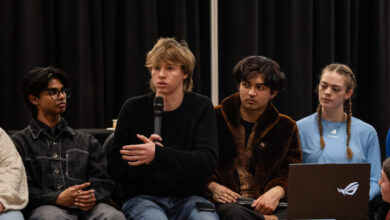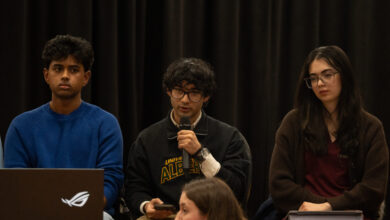Donald Trump: A cautious and educated comparison to fascism
 Gage Skidmore
Gage SkidmorePresident Donald Trump has been a controversial figure to say the least, but is the left correct in calling him a fascist?
Well the short answer is “No,” but the long answer is “it’s complicated.” To attempt to sort out this complication, I went around the university’s history department to pose this question of the idea of Trump being fascist, which elicited varying and, to some, hopefully, sobering results.
My first stop was with Latin American history Professor Jaimie Heilman, because I thought her perspective would be interesting considering Trump’s comments on the border wall and Mexicans themselves. While Heilman referenced many democratically elected governments in Latin America that committed atrocities, she said that the term fascist is seldom used because of “its connections to Europe.” She urged the importance of “speaking of Trump’s policies and rhetoric as racist.” Heilman maintained the stance of Trump polices being based on racist fears rather than the European label of fascist. Heilman went as far as to say, in regards to Trump’s policies, that we should “speak forthrightly about calling these polices and rhetoric racist and not shying away from talking about racism and xenophobia.”
American history Professor Susan Smith was my next stop, since I had taken her class on American history and was curious to see her stance on America’s current political situation. She, like many scholars in her field, urges people to be “cautious” when using the term fascism, as it’s dictatorial and oppressing features are “very historical specific (to Europe) in that interwar era.” She sees similarities, however, in Trump’s presentation as the “Authoritarian Saviour” and in his language used in GOP conventions. She evidenced his claims that “America is broken, and (he) alone can fix it.” Smith brought up that one doesn’t need to look to Europe for comparisons as American history is full of similar leaders. Specifically, the rise of the second KKK in 1915. The key relation present is the focus on “reactionary populism” and its desire to bring back power to the people. Similarly, Trump wants to “defend traditional America.” She said this sense of populism isn’t exclusive to Europe but has been present in America prior to Trump’s ascension to public office.
I thought I’d pursue a German historical narrative from Dennis Sweeney, an associate professor with the university. Sweeney is also skeptical of labelling Trump as a fascist because a key element (historically) of rising fascism is combating an organized left, but he chuckled as there isn’t “much of an organized left in the United States.” He also cited the lack of “paramilitary organization and direct political violence.” He further noted that “fascists prefer to beat people up rather than debate and discuss.” Since these elements are missing, Sweeney was reluctant to call Trump a fascist in a historical sense as “history never repeats itself.” However, he did declare Trump’s “populist” and “authoritarian” demeanors as worrying aspects.
Finally, I spoke with Srjda Pavlovic, an instructor with history department who focuses on modern Europe. He hesitantly agreed with the sentiment but included the caveat of Trump being a fascist in the “postmodern type” rather than in a historical sense. Pavlovic establishes that Trump belongs to an “ideological line linking Mussolini, the Argentine populist, Juan Peron, and the former Italian prime minister, Silvio Berlusconi, and many more populists and right-wing politicians.” He also notes that Trump’s ability through his speeches, “despite his limited vocabulary and questionable intellectual capabilities,” was able to mobilize enough support to win him the presidency. He notes that this was similar to many right wing European political parties. He concluded that Trump’s victory was another example of “populism being the inevitable product of the problematic relations between capitalism and democracy.”
The main thing all the professors stressed is to be cautious when using fascism as a point of comparison. It is crucial to consider the unique historical framework that was present for the rise of fascism in Europe, and modern day America. In a difficult position like this, it does not equate to interwar Europe. Fascism is not a term the left should use lightly, as it carries a hefty weight. It seems that people on the far left have forgotten what historical, European, fascism was. The accusation used to carry serious heft considering its damage to Europe, and the context, as to which it was created, now is used by the far left to describe right wing figures that directly combat their views. History and context matters especially when one throws the accusation of being Fascist.
I say this, but considering how Tumblr and Buzzfeed “news” is currently, it will likely fall on deaf ears.




